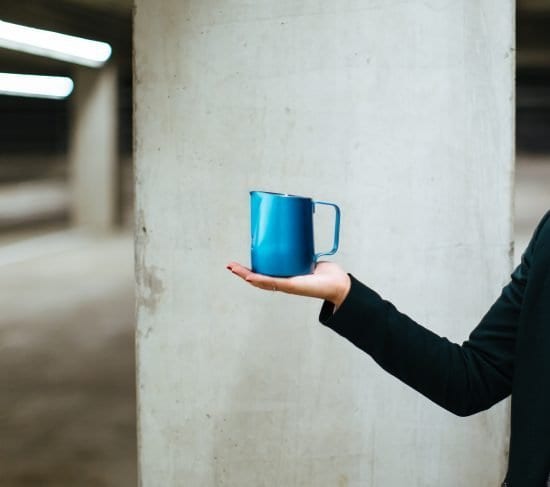
Anita Tam is the owner of Slow Pour Supply. A Hong Kong native who calls Houston her home, Anita is on a mission to make coffee more inclusive.
BY ASHLEY RODRIGUEZ
BARISTA MAGAZINE ONLINE
Photos courtesy of Anita Tam
It’s difficult to capture just how amazing Anita Tam is; she’s the brains behind Slow Pour Supply and is based in Houston. If you ask anyone what Anita’s presence in the specialty-coffee community means, you’ll likely get an answer that mentions her thoughtfulness, kindness, and commitment to promoting equity.
Anita doesn’t just talk the talk—she walks the walk. Through sponsorships and programs aimed at providing tools to folks who need them, Anita is constantly looking for ways to use her company to promote others. Anita is intentional with her decisions, and has become one of the beacons of what specialty coffee can be. I’m honored to share this extended interview with her.
Ashley Rodriguez: What are your earliest memories of coffee? Did you grow up drinking coffee?
Anita Tam: Coffee has always been part of my memory, but I did not start drinking coffee until I was in middle school. I grew up drinking a lot of tea.
My grandfather used to make Irish coffee, or add liquor to coffee that he prepared at home. Growing up under the British Colonial rule also meant we drank a lot of tea with milk! My mom worked for a British firm and she loved the “milk tea,” which obviously is tea with milk or cream added to it, plus cane sugar. A really authentic Hong Kong-style milk tea also means using Ceylon black tea, transferred through a mesh (kinda looks like a butterfly net), and the product is a creamy, strong, and silky smooth beverage—sweet, buttery in taste, and very satisfying. I drank a lot of that during my childhood.

I also enjoyed the Iron Goddess of Mercy tea prepared by my grandma. She did that almost like a ritual. My grandma escaped from the second Sino-Japanese war to come to Hong Kong around 1940. She escaped communism, too. She has passed on to us the traditional rituals of tea drinking, which she would prepare for us after dinner, Kung Fu tea. I still have fond memory of the huge stainless steel kettle she used to boil water. Water needed to be freshly boiled. Teapots needed to be warmed prior to adding the tea leaves.
Tea was drank with meals, in the afternoon, before bed. Different types of tea was drank with different purposes, or even according to how your body felt. Tea was everywhere.
When I was in middle school, ready-to-drink coffee products were very popular. That’s probably my first real memory of drinking coffee. I would buy these cans of iced lattes (Pokka Coffee was the brand) from the kiosk, usually chilled. There was, of course, added sugar and cream (amongst other ingredients I could not pronounce).
I can still vividly remember the taste of it.
You have a background in music—can you tell us a little about that?
Yes. I grew up playing music since the age of 6. For a very long time I thought that would be the only thing I would do for the rest of my life. My first degree was in composition and sound production, then I would later start my career as a conductor, and that was what I’ve been doing mostly for years and also through my graduate degree. I was interested in gender in music. Music is also a very visual art form, and I had experienced and seen lots of inequality in pay and opportunity in the industry. That has prompted me to think a lot on my career path and the proper compensation on what our work is worth.

Are you still involved in music? How does your music background inform your coffee career?
My last performance was in 2015. Yes it’s been a while, but I don’t think music will ever leave me. I’ve been in there for too long to separate myself from it. It has part of me and will continue to affect how I see things every day.
There are lots of similarities between specialty coffee and music. Both are time-delicate products, sensitive to the environment of which they are produced. They should both call for more appreciation, and are often overlooked and under-appreciated (think batch brew and elevator music). I can compare the baristas as the performers/ interpreters of coffee. There are elements of human connection, fine motor skills, multitasking, and objectivity, but also subjectivity that is required of a great musician. I believe that is the same for a great barista.
Due to the technicality that is required to perform the tasks of a barista’s job, I oftentimes feel that great baristas are being under-appreciated, and those who have the passion to compete and excel should be more supported. Imagine the time and resources put into preparing a routine, travel, lodging, and everything else added on top of taking time off to go compete. It’s a huge investment, and this courage and determination should be well encouraged and rewarded. At the same time, education within a company should be supported and modeled from the top down.
Education can help with understanding cost, quality control, bar flow, and hospitality, just to name a few. Education raises understanding thus improving the quality and efficiency, and efficiency is profit and can go back to support other parts of the cycle. If you cannot tell your musicians why they are out of tune, you should find someone who can—and if that someone is doing a great job, then you should invest more into them as well.
Flow is important. In my experience as a musician, a proper setup of the stage and instruments prior to cue time can make or break your performance. As a barista trainer/technical judge, the first thing I ask is, “Is this workspace set up in a proper way for us to maximize workflow and avoid accidents? Are we using the right size tools for the best results?”

Of course, the last question to this equation is us ourselves. Are we focused on the process? Same in latte art—if we are willing to break down the many fine motions and be intentional with all the elements, we will be more sensitive toward the small nuances, thus enabling us to tweak micro changes. Break it down, take it slow, and practice to build flow control. Thus the company name, Slow Pour—to remind us that intention is key.
How did the idea for Slow Pour begin? How do you describe your business to others?
The idea of Slow Pour Supply came in 2017 as I was looking for ways to break through a plateau I was at in latte art. I travelled to Taipei to take latte art classes at the Milkglider Latte Artist Unity, a shop that was operated by a group of latte art champions. That’s when I started to notice how the pitcher I was given positively affected my flow rate so dramatically that I needed to get this product for my baristas.
Visuals are important to me. Latte art is a reflection of the foam quality and the ability to manipulate flow while combining two liquids of different viscosity, and whatever you choose to pour on your coffee, that process is an inevitable part of a barista’s work.
When you walk into a cupcake shop, even though you know the icings probably all taste similar, the look and how it’s placed affects your assumption of the texture and perceived value of the product. A well-placed icing with beautiful, well-defined shape is oftentimes more attractive than a blob on the cake.
But then you have to get the right tools that are perfect for the job. In this case, these slanted-top WPM pitchers have been in the market since 2015, and are a trusted brand of pitchers across Asia. It had completely changed the flow for me, and for many others who have entrusted them in their daily workflow and at competitions.
So, for Slow Pour Supply, our goal is to provide better tools, to serve baristas, and to support fostering the diversity in our industry. We are constantly being reminded who we are and our role in this industry by those we personally interact with everyday, and by those [to whom] we hand-write our cards to be included in each package we send.
To us, this diversity means more than gender and race. Diversity also means we provide a platform to showcase people’s work and meet them where they are. Diversity means to show what is being underrepresented and helping them get there, and at the same time, share the experience of the skilled baristas and help spread education.
Why are social justice initiatives important to you? How do you involve them in your business model?
Social justice initiatives are important, and have constantly guided us through our decision-making process, because it simply means to me “doing what’s right on our part.” We all play a part in our coffee community, and not a single person or a single establishment can flip the table and provide a solution that will solve everything. Topics like accessibility, gender equality, or wages are subjects that require changes being made on multiple levels.
Companies like Acaia, La Palma y El Tucan, Miir, and Pacific Foods have paved the way for new companies like ours to navigate ways to express our support for the community. These companies all participate in their own ways to drive their initiatives forward to serve communities within and beyond our coffee industry. For Slow Pour Supply, there are things we can do on our part: to make great tools accessible that are effective for what they are for, supportive of the people who are using them, with the goal of empowering those who have set their passion into elevating the art of it—and these goals can be achieved in an accumulation of small steps.
As a small-size company that is new to the market, we do not necessarily have the extravagant dispensable budget, but if we find the right link to contribute to the chain, sooner or later the tipping point will happen. What Slow Pour Supply wants to do is to be responsible for our resources, and thus providing direct support to the baristas is important to us—whether they are first pours, or champions. As we are continuing our path to explore creative ways, we need to remind ourselves that our support needs to be in line with our core values.

There are also other projects and channels we work on in supporting on foster diversity. We launched #pitcherforacause, in which all proceeds go to our benefiting organization, and this year, our partner is IWCA (International Women’s Coffee Alliance). We also looked for other ways to support competitors including launching lodging sponsorships, and adding underrepresented groups, like post-treatment survivors of mental, or serious illness, or substance abuse, onto our sponsored list.
We recently did an interview with Sam Spillman and her answer was spot on. We asked her for a pro tip for first-time competitors seeking sponsorship; her answer was, “This industry has the potential to be very inclusive, but you have to invite people into your experience.” Both competitors and companies will have to step forward into this relationship. For Slow Pour Supply, our responsibility lies in how accessible and welcoming we provide this experience to the community we support.
What do you want people to know about you?
I’m a WoC (woman of color), I’m originally from Hong Kong, but if you ask again, I am really from Houston. I’m a musician turned coffee person, AST (Authorized SCA Trainer), current USBC Lead Technical Judge, and a barista turned entrepreneur. I used to bring my pitchers to work and it would also be my usual gift for my new coworkers in training. I love pencils and drawing with them. I guess it feels the same that I love pitchers, too.
I love tools and anything technical. My biggest hero in coffee is Ildi Revi (of Ally Coffee). I cannot thank her enough.

